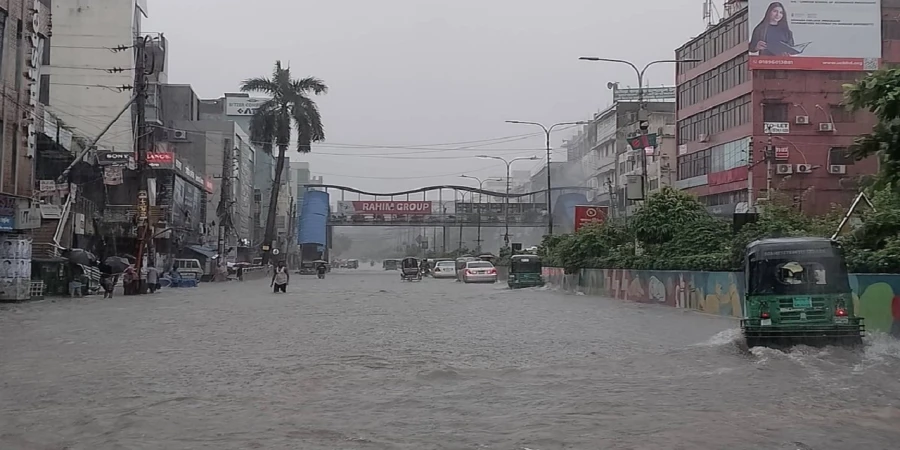
ছবি: Photo: Collected
Meteorologist Mustafa Kamal Palash, a PhD researcher on weather and climate at Canada’s University of Saskatchewan, has predicted record-breaking rainfall in Bangladesh, despite the ongoing mild cold wave. The announcement was made via a social media post on Facebook on Monday, December 16.
In his post, Palash stated that there is a strong likelihood of unprecedented winter rainfall across Bangladesh on December 20 and 21. He compared the anticipated rainfall to the record-breaking rains experienced on February 4 and 5, 2022. According to his analysis, the upcoming rains could match or even exceed that record.
Palash highlighted that a low-pressure system is expected to form in the southwest Bay of Bengal on December 18 and 19. Simultaneously, a strong western low-pressure system is forecast to move across India and Bangladesh during the same period. The combination of the western low-pressure system over land and the low-pressure system over the sea is expected to trigger heavy winter rains across Bangladesh on December 20 and 21.
He expressed a high degree of confidence in this forecast, estimating a 90% certainty of heavy rainfall occurring during this time. The regions expected to experience the heaviest rainfall include the districts in the Khulna, Barishal, Dhaka, and Chattogram divisions. These areas are likely to face the most significant impact of the rainfall. Meanwhile, the districts in Rajshahi, Mymensingh, and Sylhet divisions are expected to experience moderate rainfall. The Rangpur division is forecast to receive relatively lighter rainfall compared to other regions.
Palash specifically warned that the anticipated heavy rains could cause significant damage to agricultural activities, particularly in the Khulna, Barishal, Dhaka, and Chattogram divisions. Potato farmers in these regions are at considerable risk, as prolonged water accumulation due to heavy rains could severely impact potato fields. He advised farmers in these regions to refrain from irrigating potato fields artificially until December 22 to prevent further waterlogging and damage.
In addition to potato farmers, Palash also addressed the broader farming community in southern Bangladesh. He advised farmers to take necessary preparations to drain excess water from their fields in anticipation of the heavy rains. This precautionary measure, he emphasized, is essential to mitigate potential crop damage and reduce losses.
The forecast of such intense winter rains during a cold wave has raised concerns among farmers, meteorologists, and policymakers alike. Winter rains are uncommon in Bangladesh, and when they occur in significant amounts, they can disrupt agricultural activities, cause waterlogging, and damage crops that are not prepared for such conditions.
The agricultural sector in Bangladesh is particularly vulnerable to unexpected weather events, given its heavy reliance on seasonal rainfall and irrigation patterns. Potato cultivation, which is currently at a crucial stage in many parts of the country, could face severe consequences if heavy rains materialize as predicted. Waterlogging caused by excessive rainfall can lead to rotting of crops, rendering them unsalvageable. This would not only impact the livelihoods of farmers but also disrupt the supply chain and market prices for essential vegetables.
The combination of a western low-pressure system and a southwest Bay of Bengal low-pressure system is an unusual meteorological occurrence during this time of year. Typically, winter in Bangladesh is marked by dry and cold conditions. However, the presence of these two systems simultaneously has created an environment conducive to heavy rainfall. The interaction between the two pressure systems will result in moisture-laden winds being driven over Bangladesh, leading to intense precipitation.
The regions most at risk—Khulna, Barishal, Dhaka, and Chattogram divisions—are also areas where agricultural activities are most intensive. Farmers in these divisions are heavily engaged in potato, rice, and vegetable cultivation. Any significant disruption caused by heavy rainfall could have far-reaching economic consequences for both farmers and consumers.
In response to Palash’s forecast, agricultural experts are urging farmers to stay vigilant and take preemptive measures to protect their crops. Proper drainage systems in fields, timely removal of excess water, and refraining from unnecessary irrigation are among the key recommendations being shared with farmers in vulnerable regions.
Local agricultural offices and extension services are also being encouraged to disseminate this information to farmers promptly. Effective communication of weather forecasts and precautionary measures is critical in minimizing crop losses and supporting farmers during unexpected weather events.
The meteorological warning has also sparked discussions among policymakers about the increasing unpredictability of weather patterns in Bangladesh. Climate change has been cited as a contributing factor to such unusual weather events, with rising global temperatures leading to shifts in traditional weather systems. Bangladesh, being a low-lying and climate-vulnerable country, is particularly susceptible to these changes.
The forecasted heavy rains on December 20 and 21 serve as a reminder of the need for improved climate resilience in the agricultural sector. Investments in better drainage systems, weather monitoring technologies, and farmer education programs are essential to mitigate the impact of such events in the future.
While Palash’s forecast has generated significant attention, it also highlights the importance of accurate and timely meteorological predictions. As Bangladesh prepares for the possibility of record-breaking winter rainfall, the focus remains on safeguarding crops, supporting farmers, and ensuring that agricultural activities can recover quickly from any potential damage.
Farmers across the country, particularly in the most vulnerable regions, are being urged to stay informed and take appropriate measures to protect their fields. Palash’s warning has underscored the critical role of weather forecasts in agricultural planning and disaster preparedness.
As the anticipated dates approach, meteorologists and agricultural experts will continue to monitor the situation closely. Updates on the low-pressure systems and their impact will be essential in guiding farmers and authorities in their preparations. For now, the focus remains on minimizing the potential damage caused by the forecasted heavy rains and ensuring that Bangladesh’s agricultural sector can withstand this unexpected weather challenge.
repoter






